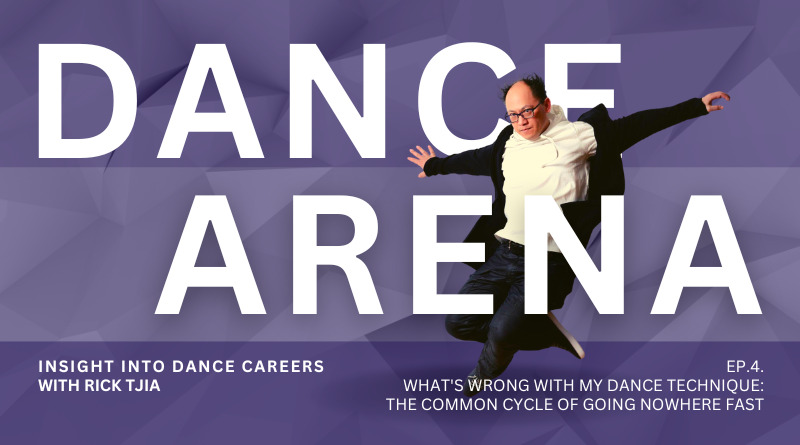Dance Arena Ep.4. – What’s Wrong With My Dance Technique?

So much work. So much sweat. So little improvement. What’s wrong with my dance technique?
So I add another technique class to my schedule. I add practice hours. I train on weekends.
I wait for results that do not come. Wash, rinse, repeat.
This is the dance student’s life – and the professional’s life, for that matter. And yet we still haven’t figured it out. It ain’t working.
Wash, rinse, repeat. And that is exactly what we do, and the result is the same as yesterday. As last week. As last month.
“Insanity is doing the same thing over and over again, but expecting different results.” We’ve all heard this (and if you haven’t, then you just did now). So why can’t we seem to assimilate the simple lesson that this quote embodies?
Let me paraphrase it in a different context: If you try something in class and it doesn’t work, then don’t repeat it. Don’t do it again, because – well, it doesn’t work.
Theoretically, any one error should only ever happen once. Not many things are as foolhardy as practicing the same thing in the exact same way for two years and wondering why it’s not getting better. Laboratory rats will not make the same mistake after a couple of tries; theoretically, dancers should be able to one-up the rat.
Learning is about constantly breaking down and rebuilding. In order for breakthroughs to happen, theories need to be broken. Beliefs that are not bringing results need to be reexamined.
Adding more class time and more practice time is not always the answer – basically because while you’re in class and practicing, you are not improving.
What?? During class and practice I’m not improving? What?
Yes, that is correct. While you’re in class and practicing, you are not improving.
So that’s been said; let’s work on a race car now, shall we?
During test runs on a car, we race the car on a track, then mechanics work on it afterwards. The mechanics do not work on the car while it is going at 200 kilometres an hour. I think that most of us can agree that that would be rather stupid and ever so slightly suicidal. Mechanics work on the car afterwards.
A race car does not get adjusted during test runs. Test runs are used to gather information. Calibration/adjustment/maintenance is done when the car is at rest – so that the next time it goes out, it can perform better.
Dance class and practice are test runs, during which information is gathered.
But improvement happens during rest. Learning happens during rest. Your body builds strength during rest. Your technique gets better during the times that you are not dancing.
“In order for breakthroughs to happen, theories need to be broken. Beliefs that are not bringing results need to be reexamined.”
Errors need not be practiced.
And rest absolutely must happen between classes, between rehearsals, between practice sessions. Learning dance is algebra: training and rest are two sides of an equation, and both sides of the equation need to be balanced at all times.
Back to Home
Editor's Note: At StageLync, an international platform for the performing arts, we celebrate the diversity of our writers' backgrounds. We recognize and support their choice to use either American or British English in their articles, respecting their individual preferences and origins. This policy allows us to embrace a wide range of linguistic expressions, enriching our content and reflecting the global nature of our community.
🎧 Join us on the StageLync Podcast for inspiring stories from the world of performing arts! Tune in to hear from the creative minds who bring magic to life, both onstage and behind the scenes. 🎙️ 👉 Listen now!
